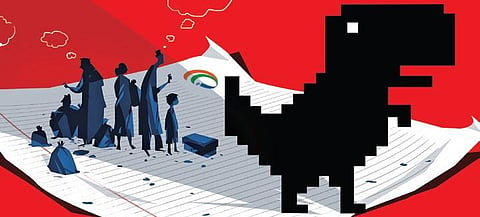

The continuing violence in Manipur between the majority Meitei community and the hills’ tribal Kuki groups has inflicted heavy collateral damage in an unexpected area: internet communication. The state government, unable to control the flare-up, cut internet connectivity on the 3rd of May and has since been extending it from time to time.
Among the many reasons given in its latest order extending the ban till 20 June, the Commissioner (Home}, Government of Manipur, says “some anti-social elements may use social media extensively to transmit images, hate speech and hate video messages inciting the passions of the public..”
But isn’t this akin to throwing out the baby with the bathwater? A lawyer and a businessman from Manipur have filed a PIL in the Supreme Court claiming the continuing internet shutdown has seriously impacted business and education and is disrupting normal social life. The apex court is on a summer break and the matter is yet to be heard.
A recently released report by Human Rights Watch and the Internet Freedom Foundation says that the arbitrary internet shutdowns are incompatible with the ‘Digital India’ Mission and negatively impact the poorest of communities dependent on online services.
Trigger-happy policy
India has earned the dubious distinction of forcing the maximum number of internet shutdowns in the world. Internet shutdown tracker sflc.in has recorded as many 734 separate shutdowns since 2012, with Jammu and Kashmir accounting for the maximum number of breaches at 421.
The longest single shutdown followed the abrogation of Article 370 in Jammu and Kashmir when the government shut down 4G mobile internet access for 550 days, from 4 August 2019 to 6 February 2021. Other conflict zones too have been made to suffer suspension of services at the slightest hint of social unrest. Darjeeling, which saw an agitation for ‘Gorkhaland’ in 2017, was without internet and broadband services for 100 days from 18 June 2017.
More recently, mobile internet and SMS services were blocked in Punjab in March this year when police were hunting for the pro-Khalistani radical preacher, Amritpal Singh. Rajasthan too has seen frequent internet shutdowns – the longest one being for 133 days in 2016 days – for the ostensible reason of reducing the chances of copying in examinations! Should businesses and communication systems suffer because of the Rajasthan government’s incompetence to police its examination centres?
It is not just the right of freedom of speech and expression guaranteed under Article 19(a) of the Constitution that is at stake. India’s public services under the ‘Digital India’ programme are also being threatened.
The Mahatma Gandhi National Rural Employment Guarantee Act (MGNREGA), which provides income security for over 100 million households in rural areas, has been digitized, and internet access is a must for recording attendance and disbursing wages. Similarly, food distribution programmes under the National Food Security Act are linked to Aadhar, which in turn requires online identification. Any disruption of internet access can have a serious impact on these vital rural schemes.
Legal violation?
Shutdowns till 2017 were imposed largely under Section 144 of the Code of Criminal Procedure (CrPC) which gave the District Magistrate the powers to prevent unlawful gatherings of people. However, in 2017 the provisions under the Indian Telegraph Act, of 1855 were amended and the Temporary Suspension of Telecom Services (Public Emergency or Public Safety) Rule, 2017 was brought in force.
These provisions have significant procedural checks. For instance, only an officer of the rank of Secretary (Home Affairs) has the power to issue a temporary suspension of the Internet vide a reasoned order. Further, a high power Review Committee has the power to review all such orders. However, few of these provisions are honoured, and suspension orders are passed routinely and without application of mind.
The Supreme Court in January 2020, in a landmark judgment, in the cases Anuradha Bhasin v. Union of India and Ghulam Nabi Azad v. Union of India, held that suspension of internet services can only be for temporary and limited purposes. The Court also said shutting down the internet is a “drastic measure” that must be considered by the state only if it is “necessary” and “unavoidable,” after assessing the “existence of an alternate less intrusive remedy.”
However, these guidelines by the apex court have been largely ignored by government authorities. The Human Rights Watch report identifies at least 127 shutdowns across 18 states in the 3-year period between January 2020, when the Supreme Court passed its judgment and 31 December 2022.
On the ground, there is little to show that the suspension of internet services helps maintain law and order. In fact, the opposite is probably true. Many journalists this writer met as part of a fact-finding committee in J&K recently, deposed that the period of ‘Internet darkness’ the union territory saw was marked by wild rumours and unsubstantiated claims that neither government nor private sources could counter.
A digital world can ill afford this ostrich policy. It is about time the government review its approach to the Internet in conflict situations. If not, the judiciary will need to step in.